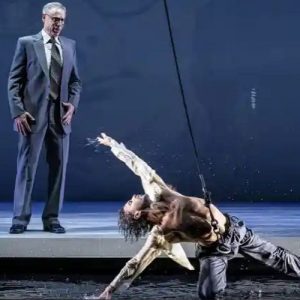Watershed.
Composed by Joseph Twist. Libretto by Christos Tsiolkas and Alana Valentine.
Directed by Neil Armfield.
Conducted by Christie Anderson with the Adelaide Chamber Orchestra and the
elite Adelaide Chamber Singers. Dunstan Playhouse. Adelaide Festival Centre.March 2-8 2022
Reviewed by Peter Wilkins
May 10th 1972. It is Adelaide’s day of shame. At 11.07 at night, British law professor, Dr. George Ogilvie Ian Duncan was pushed into the River Torrens. His assailants looked on, laughing and taunting the flailing figure until, unable to swim, he disappeared from view into the river of no return. Fifty years on no-one has yet been convicted and although three policemen on duty at the time were brought to trial they were all acquitted. This tragic event became a watershed moment for change and the eventual decriminalization of homosexuality in South Australia, the first state in the country to embed this important reform in the legislature.
This is the background to the powerful, moving and soul-stirring Oratorio Watershed, , composed by Joseph Twist, with libretto by Chris Tsiolkas and Alana Valentine, conducted by Christie Anderson and directed by Neil Armfield. The Adelaide Chamber Choir and the elite Adelaide Chamber Orchestra provide the heart and soul to Twist’s composition. Tsiolkas and Valentine’s lyrical and haunting libretto traces the events over half a century since Duncan’s drowning. Twist‘s composition is transformative, retaining the conventional form of the oratorio with the choir and the soloists but his work is dynamic, changeable and emotive. He embraces the elements of musical theatre in the threatening scene with the police at the bank of the Torrens. The chorus of mourning mothers is operatic and Duncan’s death assumes the sacred rites of the oratorio. As the curtain falls the dancer representing the drowned Duncan assumes the pose of the Pieta before being resurrected and ascending out of sight. The spirit of Duncan remains, a testament to the changes since his death. They have been slow in coming and even the legalization of homosexuality in 1975 would not prevent opposition and prejudice.
Worse still, officers Brian Hudson, Francis Cawley and Michael Clayton who were identified by whistleblower Mick O’Shea, were acquitted of manslaughter after refusing to testify. “Shame turns to rage” and a woman sings “I did not know what justice was until I knew what it wasn’t”. The anger remains and Trix’s composition haunts the production. So too does the twisting, turning body of the dancer, suspended above the stage and slowly descending into the water, his body gyrating like a carcass upon a hook. It is the image of brutality and sacrifice.Armfield directs with surety, keeping our focus firmly on the singers and the surtitles above the projected images of the site of the crime, press clippings from the Advertiser at the time and the images of people such as Premier Don Dunstan, the suspects and people involved in Duncan’s life. Throughout the narrator moves across the stage, barefoot through the water and directing the soloists to the left and right. I have no programme to identify the narrator, the tenor, the baritone, the sopranos or members of the ensemble from the choir. Suffice to say that Watershed is a work of passion and a powerful belief in justice and the lasting memory of a man who sought love and was denied life.
Watershed is an oratorio that touches the soul and affirms what is noble in life. It recognizes the power of love and the sacrifice too often made to seek and embrace love. It resounds in the orchestra under Anderson’s baton, in the voices of the narrator and the soloists playing the characters in the drama. It is vividly expressed in the movement of the dancer under Lewis Major’s choreography and in the force and sensitivity of Armfield’s direction.I feel a sadness as I leave this moving and stirring, enraging and love affirming oratorio. It is the story of the deadly consequences of gay hate, but it is also the universal statement on the destructive nature of prejudice and the precious sanctity of love. Twist's’s oratorio lifts this work to sacred heights and it is an unforgettable experience that deserves to be seen by all who believe in the rights of all people to express love and be blessed by love. It should never be a love that dare not say its name.


